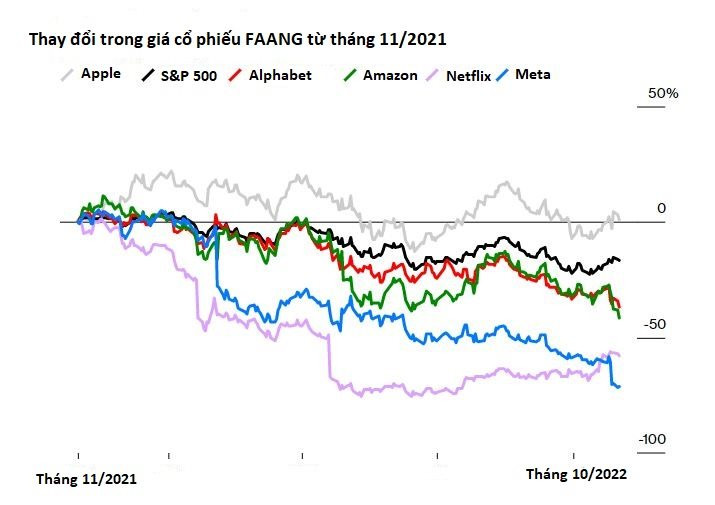Mark Zuckerberg makes Meta lag after 5 years, no longer ‘invincible’: The golden age of FAANG stocks is over
- Tram Ho
When a large stock plunges, investors are often advised to look at long-term profitable performance. However, in the case of Meta – the giant that lost almost 25% of its market value on October 27, the above approach hardly helped.
If you bought Meta shares 5 years ago, when the company was still Facebook, your account has evaporated about 49% now. Thus, Meta not only failed to promote its role as an essential technology company, but on the contrary, returned to the line in 2015.
Meta is not like many other stocks. It is part of FAANG – a group of technology companies that are said to be “invincible”. Along with Facebook, Wall Street has Amazon, Apple, Netflix and Alphabet, the parent company of Google. Most are considered safe investments because they best reflect the growth of the economy, from retail to entertainment to smartphones. The capitalization of these Big Tech is also too large to collapse.
However, by 2022, though FAANG still contributes more than 13% of the value of the S&P 500 index basket, the heyday of these giants seems to be over. Ending because of Meta and growing skepticism about the vision of a CEO with a vague, fledgling metaverse dream. It ends because investors have also begun to change their minds about the long-term growth promise of technology corporations, while the profits of the past few quarters have not been very positive.
While the decline in market capitalization over the past 12 months has not been as deep as that of Meta, most FAANGs have had a rough time, with an average drop of 40% to 60%.

“ Investors are having a crisis of growth confidence. Those who have poured money into Big Tech say the decline “could last for years ,” said Gene Munster, co-founder of Loup Ventures, a technology investment firm.
Investors’ anxiety about Meta has been building for months. Since the beginning of the year, this company has witnessed the worst decline in US stock history when it lost more than $251 billion in market capitalization. Above all, however, Meta remains committed to investing more in technology to facilitate the transition to the metaverse – an immersive digital world in its infancy.
In response to negative comments about his vision, Mark Zuckerberg said that “usually there will be a few versions of bugs before a product becomes mainstream”. There are still people who put their faith in Meta in the long term, including Gene Munster. He believes that if there is a big step forward for social networking beyond mobile, only Meta and a few other big companies can seize the opportunity.

Mark Zuckerberg makes Meta 5 years behind, no longer “invincible”: The dark era of FAANG begins
However, the message from investors so far has been clear. They don’t want to take the risk of betting on something that can be paid back years later. These investors themselves just want to pour capital into companies with better profitability.
This is the usual approach, but not always for Big Tech. Corporations are constantly changing until they reach the desired growth rate, such as Amazon, which has gone from an online book site to become the largest cloud-integrated retailer in the United States. Facebook was once just a homepage for college students, but has since turned into the world’s largest social networking platform with a number of features, from messaging, photos to videos.
“ Facebook has proven what it is capable of, from being nil to being in a position to get everything it wants. The question is, can Facebook do this again? There’s a lot of skepticism out there, ” said Marshall Front, chief investment officer of Front Barnett Associates.
This skepticism stems from Meta pouring money into the metaverse, while its core business is slowing down. From 2013 to 2021, Meta achieved an average annual revenue growth of about 42%. This year, the group’s sales are expected to drop 1%, according to the average estimate of analysts. The reason comes from the fierce competition of TikTok and the fear of stronger spending cuts by advertisers in the context of a recession. This also weighs on other social media companies, such as Snap.

If you bought Meta shares 5 years ago, when the company was still Facebook, your account has evaporated about 49% now.
The wavering in investor confidence multiplied when the US Federal Reserve decided to raise interest rates to curb inflation. This hit tech companies especially hard, because the valuations of these Big Techs are based entirely on the promise of future profits. When interest rates rise, investors will certainly not be willing to put down money to bet on less certain returns.
According to Bloomberg, this is not the first time that Big Tech stocks have sold off so much. Previously, at the time of the outbreak of the pandemic, the capitalization of these companies also struggled before recording a record growth. In 2018, the Fed’s decision to raise interest rates also negatively impacted technology stock prices.
However, it has been 11 months since the last sell-off. There is little signal that this decline will end in the near future. Inflation remains on the rise and Fed officials warn they won’t abandon old policy until prices cool.
“ Investors have questioned whether investing in the metaverse is distracting Meta and neglecting other growth goals. They were too hasty to commit ,” Scott Kessler, global head of technology at investment researcher Third Bridge, said of Meta.
By: Bloomberg
Source : Genk
